U.S. Federal Courts
Supreme Court rules against Affirmative Action
The decision allows the U.S. Naval Academy and West Point to continue to use, at least for now, race-conscious admissions programs

By Amy Howe | WASHINGTON – In a historic decision, the Supreme Court severely limited, if not effectively ended, the use of affirmative action in college admissions on Thursday.
By a vote of 6-3, the justices ruled that the admissions programs used by the University of North Carolina and Harvard College violate the Constitution’s equal protection clause, which bars racial discrimination by government entities.
Writing for the majority, Chief Justice John Roberts explained that college admissions programs can consider race merely to allow an applicant to explain how their race influenced their character in a way that would have a concrete effect on the university. But a student “must be treated based on his or her experiences as an individual — not on the basis of race,” Roberts wrote. The majority effectively, though not explicitly, overruled its 2003 decision in Grutter v. Bollinger, in which the court upheld the University of Michigan Law School’s consideration of race “as one factor among many, in an effort to assemble a student body that is diverse in ways broader than race.”
Justice Sonia Sotomayor dissented, in an opinion that was joined by Justices Elena Kagan and Ketanji Brown Jackson. Sotomayor emphasized that the majority’s decision had rolled “back decades of precedent and momentous progress” and “cement[ed] a superficial rule of colorblindness as a constitutional principle in an endemically segregated society.”
Thursday’s ruling was the latest in a series of challenges to the role of race in university admissions. In both the North Carolina and Harvard cases, the plaintiffs had asked the justices to overrule Grutter. In her opinion for the majority in that case, Justice Sandra Day O’Connor reaffirmed that “student body diversity is a compelling state interest that can justify the use of race in university admissions,” but she warned that race-conscious admissions policies should not last forever. In 25 years, she suggested, “the use of racial preferences will no longer be necessary to further the interest” in diversity.
Eleven years after the court’s decision in Grutter, a group called Students for Fair Admissions filed the North Carolina and Harvard cases in federal court. The group was founded by Edward Blum, a conservative activist who had also spearheaded a challenge to the admissions policy at the University of Texas at Austin as well as to Shelby County v. Holder, the 2013 case that narrowed the Voting Rights Act.
After the lower courts upheld both North Carolina’s and Harvard’s admissions policies, the Blum’s group came to the Supreme Court, where it asked the justices to overrule their decision in Grutter and bar the consideration of race in university admissions altogether. The court that agreed to take up both cases last year was a very different, and much more conservative, court than the one that had upheld the UT-Austin policy seven years before. Justice Anthony Kennedy, the author of the UT-Austin decision, retired in 2018 and was replaced by Justice Brett Kavanaugh, while Justice Ruth Bader Ginsburg was succeeded by Justice Amy Coney Barrett.
In a 40-page opinion that addressed both the Harvard and UNC cases, Roberts emphasized that the Supreme Court had only allowed universities to use race-based admissions programs “within the confines of narrow restrictions.” But the Harvard and UNC programs, “however well intentioned and implemented in good faith,” Roberts explained, do not comply with those restrictions.
Both programs, Roberts began, consider race as part of their admissions program for commendable goals, such as “training future leaders in the public and private sector” and “promoting the robust exchange of ideas.” But those goals are too vague for courts to measure, Roberts reasoned.
The programs also use race in a “negative” manner, Roberts next explained, despite the Supreme Court’s admonition that “an individual’s race may never be used against him in the admissions process.” Although both universities contend that an applicant’s race is never a negative factor, Roberts wrote, “[c]ollege admissions are zero-sum. A benefit provided to some applicants but not to others necessarily advantages the former group at the expense of the latter.” Moreover, Roberts added, the programs also rely on prohibited racial stereotyping – the idea that minority students will always have the same views or perspectives on a particular issue.
Finally, Roberts observed, the Harvard and UNC programs lacked the “logical end point” suggested by Grutter: Both Harvard and UNC acknowledged that their programs do not have a “sunset” date. Indeed, Roberts noted, “UNC suggests that it might soon use race to a greater extent than it currently does.”
Roberts stressed that the court’s decision did not bar universities from ever considering race on a case-by-case basis. Schools, he indicated, can consider “an applicant’s discussion of how race affected his or her life, be it through discrimination, inspiration, or otherwise.” But programs like the ones used by Harvard and UNC, he complained, have “concluded, wrongly, that the touchstone of an individual’s identity is not challenges bested, skills built, or lessons learned but the color of their skin. Our constitutional history does not tolerate that choice.”
The majority’s decision left the door open for service academies like the U.S. Naval Academy and West Point to continue to use, at least for now, race-conscious admissions programs. The Biden administration, which filed a brief as a “friend of the court” in support of Harvard and UNC, had emphasized that senior military leaders believe that it is important to have a diverse officer corps, which in turn requires the consideration of race for admission to the service academies. But the service academies did not participate in the Harvard and UNC cases and the lower courts did not consider that argument. Therefore, Roberts indicated in a footnote, the Supreme Court did not weigh in on the issue, “in light of the potentially distinct interests that military academies may present.”
Sotomayor’s 69-page dissent emphasized that the “limited use of race” by colleges and universities “has helped equalize educational opportunities for all students of every race and background and has improved racial diversity on college campuses.” “Although progress has been slow and imperfect,” she wrote, “race-conscious college admissions have advanced the Constitution’s guarantee of equality and have promoted” Brown v. Board of Education’s “vision of a Nation with more inclusive schools.” “The devastating impact of” Thursday’s decision, she concluded, “cannot be overstated.”
Justice Elena Kagan joined Sotomayor’s dissent. Justice Ketanji Brown Jackson, who until last year served on Harvard’s board of overseers, recused herself from the Harvard case and therefore joined Sotomayor’s dissent as it applied to the UNC case. Jackson also filed a dissent in the UNC case, joined by Sotomayor and Kagan, in which she argued that American society “has never been colorblind.” “Given the lengthy history of state-sponsored race-based preferences in America,” Jackson wrote, “to say that anyone is now victimized if a college considered whether that legacy of discrimination has unequally advantaged its applicants fails to acknowledge the well-documented ‘intergenerational transmission of inequality’ that still plagues our citizenry.”
Editor’s Note: In an emailed statement, Imani Rupert-Gordon, the executive director of The National Center for Lesbian Rights (NCLR) said:
“We are deeply disappointed that the Supreme Court has once again upended decades of precedent in a decision that will deepen racial inequality in education and cause lasting harm not only to many students of color but to everyone in this country. The majority of Americans support affirmative action because it helps to level an uneven playing field caused by generations of racism and white supremacy. Today’s ruling continues to show just how out of step this Court is with our shared values. We know that when everyone has access to quality higher education, we are all better for it, and today’s ruling is a step in the wrong direction. We will continue to fight against those that seek to bring us back to a time of segregationist educational practice and policy and will not stop until all students – regardless of their race – are able to access the highest quality education in this country. NCLR is committed to working for racial equity in education for all of our communities.”
Shannon Minter, the Legal Director for NCLR in an email to the Blade after the ruling said:
“First as a lawyer in the Reagan and Bush administrations and later as a judge on the DC Circuit and now as a Supreme Court justice, Chief Justice John Roberts has sought to undermine affirmative efforts to remedy the lasting impact of slavery on Black people in our country and our nation’s long history of severe and systemic racial discrimination.
After gutting the Voting Right Act in Shelby County v. Holder, he has now succeeded in getting a majority of justices to support another of his major goals: banning college admission policies that take race into account as a factor, notwithstanding the critical importance of education as a pipeline to full participation in our society.
As the dissenting justices noted, the impact of this decision will be to worsen racial inequality in colleges and universities, which in turn will have a negative impact on all sectors of our society.
This dangerous decision could hardly come at a worse moment, when so many of our democratic norms and institutions are under attack. The only silver lining here is that this opinion is so far out of step with the values of most people in this country that its impact may be diminished by a renewed demand for greater racial inclusivity in higher education, which still may be achieved by many other means not addressed in today’s decision.
It is incumbent on all of us who care about maintaining a multi-racial democracy to do all we can to minimize the harm caused by this tragically misguided opinion.”
The White House released a statement by Vice President Harris on the Supreme Court’s ruling:
“Today’s Supreme Court decision in Students for Fair Admissions v. Harvard and Students for Fair Admissions v. University of North Carolina is a step backward for our nation. It rolls back long-established precedent and will make it more difficult for students from underrepresented backgrounds to have access to opportunities that will help them fulfill their full potential.
It is well established that all students benefit when classrooms and campuses reflect the incredible diversity of our Nation. Colleges and universities provide opportunities for students to interact with Americans from all walks of life and learn from one another. By making our schools less diverse, this ruling will harm the educational experience for all students.
Our Nation’s colleges and universities educate and train the next generation of American leaders. Students who sit in classrooms today will be the leaders of our government, military, private sector, and academic institutions tomorrow. Today’s decision will impact our country for decades to come.
In the wake of this decision, we must work with ever more urgency to make sure that all of our young people have an opportunity to thrive.”
****************************************************************************************
The preceding article was published by SCOTUSBlog and is republished with permission.
Read the ruling here:
U.S. Federal Courts
Federal judge blocks Trump’s trans military ban
Cites ‘cruel irony’ of fighting for rights they don’t enjoy

A federal judge in D.C. on Tuesday blocked President Donald Trump’s ban on transgender service members, which was scheduled to take effect on Friday.
U.S. District Judge Ana Reyes issued the preliminary injunction, saying the policy violates the Constitution.
“Indeed, the cruel irony is that thousands of transgender service members have sacrificed — some risking their lives — to ensure for others the very equal protection rights the military ban seeks to deny them,” Reyes wrote.
The legal challenge to Trump’s trans military ban executive, Talbott v. Trump, was brought by LGBTQ groups GLAD Law and National Center for Lesbian Rights.
Reyes found that the ban violates equal protection because it discriminates based on trans status and sex and because “it is soaked in animus,” noting that its language is “unabashedly demeaning, its policy stigmatizes transgender persons as inherently unfit, and its conclusions bear no relation to fact.”
The lead attorneys in the case are GLAD Law Senior Director of Transgender and Queer Rights Jennifer Levi and NCLR Legal Director Shannon Minter.
“Today’s decisive ruling speaks volumes,” said Levi. “The court’s unambiguous factual findings lay bare how this ban specifically targets and undermines our courageous service members who have committed themselves to defending our nation. Given the court’s clear-eyed assessment, we are confident this ruling will stand strong on appeal.”
Nicolas Talbott, a second lieutenant in the Army Reserves, and Erica Vandal, a major in the U.S. Army, are two of the 14 plaintiffs in the case. They spoke during a virtual press conference with Levi and Minter on Wednesday.
“Yesterday’s ruling is just such a tremendous step forward for transgender service members,” said Talbott.
Vandal added the ruling “clearly recognizes that transgender soldiers, sailors, airmen, and Marines have been serving openly as our authentic selves for nearly a decade in every capacity, at every echelon, in every theater and combat zone across the world, all while meeting and exceeding the same standards as every one else without causing any degradation or unit cohesion.”
Levi said Reyes’s ruling requires “the military to return to business as usual.”
The decision is stayed until 10 a.m. on Thursday. It is not immediately clear whether the Trump-Vance administration will challenge it.
“What the order does is stave off, put off any effect of the ban actually being implemented against any individuals,” said Levi.
U.S. Federal Courts
Appeals court hears case challenging Florida’s trans healthcare ban
District court judge concluded the law was discriminatory, unconstitutional
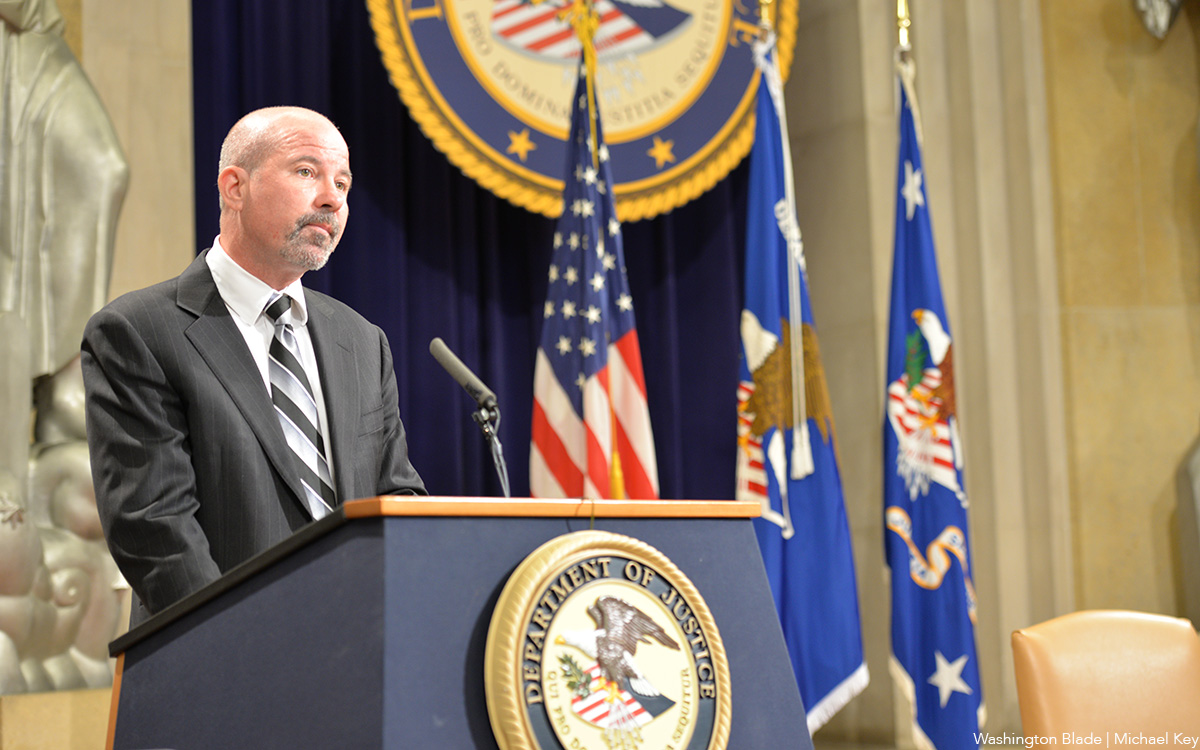
Parties in Doe v. Ladapo, a case challenging Florida’s ban on healthcare for transgender youth and restrictions on the medical interventions available to trans adults, presented oral arguments on Wednesday before the U.S. Court of Appeals for the 11th Circuit in Atlanta.
The case was appealed by defendants representing the Sunshine State following a decision in June 2024 by Judge Robert Hinkle of the U.S. District Court for the Northern District of Florida, who found “the law and rules unconstitutional and unenforceable on equal protection grounds,” according to a press release from the National Center for Lesbian Rights, which is involved in the litigation on behalf of the plaintiffs.
The district court additionally found the Florida healthcare ban unconstitutional on the grounds that it was “motivated by purposeful discrimination against transgender people,” though the ban and restrictions will remain in effect pending a decision by the appellate court.
Joining NCLR in the lawsuit are attorneys from GLAD Law, the Human Rights Campaign, Southern Legal Counsel, and the law firms Lowenstein Sandler and Jenner and Block.
“As a mother who simply wants to protect and love my child for who she is, I pray that the Eleventh Circuit will affirm the district court’s thoughtful and powerful order, restoring access to critical healthcare for all transgender Floridians,” plaintiff Jane Doe said. “No one should have to go through what my family has experienced.”
“As a transgender adult just trying to live my life and care for my family, it is so demeaning that the state of Florida thinks it’s their place to dictate my healthcare decisions,” said plaintiff Lucien Hamel.
“Members of the legislature have referred to the high quality healthcare I have received, which has allowed me to live authentically as myself, as ‘mutilation’ and ‘an abomination’ and have called the providers of this care ‘evil,’” Hamel added. “We hope the appellate court sees these rules and laws for what truly are: cruel.”
“Transgender adults don’t need state officials looking over their shoulders, and families of transgender youth don’t need the government dictating how to raise their children,” said Shannon Minter, legal director of NCLR. “The district court heard the evidence and found that these restrictions are based on bias, not science. The court of appeals should affirm that judgment.”
Noting Hinkle’s conclusion that the ban and restrictions were “motivated by animus, not science or evidence,” Simone Chris, who leads Southern Legal Counsel’s Transgender Rights Initiative, said, “The state has loudly and proudly enacted bans on transgender people accessing healthcare, using bathrooms, transgender teachers using their pronouns and titles, and a slough of other actions making it nearly impossible for transgender individuals to live in this state.”
Lowenstein Sandler Partner Thomas Redburn said, “The defendants have offered nothing on appeal that could serve as a valid basis for overturning that finding” by the district court.
“Not only does this dangerous law take away parents’ freedom to make responsible medical decisions for their child, it inserts the government into private health care matters that should be between adults and their providers,” said Jennifer Levi, senior director of transgender and queer rights at GLAD Law.
U.S. Federal Courts
9th Circuit upholds lower court ruling that blocked anti-trans Ariz. law
Statute bans transgender girls from sports teams that correspond with gender identity

The 9th U.S. Circuit Court of Appeals on Monday upheld a lower court’s decision that blocked enforcement of an Arizona law banning transgender girls from playing on public schools’ sports team that correspond with their gender identity.
Then-Gov. Doug Ducey, a Republican, in 2022 signed the law.
The Associated Press reported the parents of two trans girls challenged the law in a lawsuit they filed in U.S. District Court in Tucson, Ariz., in April 2023. U.S. District Judge Jennifer Zipps on July 20, 2023, blocked the law.
Arizona Superintendent of Public Instruction Tom Horne, who was named as a defendant in the lawsuit, appealed the ruling to the 9th Circuit. Democratic Attorney General Kris Mayes is not defending the law.
A three-judge panel on the 9th Circuit unanimously upheld Zipps’s ruling.
“We are pleased with the 9th Circuit’s ruling today, which held that the Arizona law likely violates the Equal Protection Clause and recognizes that a student’s transgender status is not an accurate proxy for athletic ability and competitive advantage,” said Rachel Berg, a staff attorney for the National Center for Lesbian Rights, in a press release.
NCLR represents the two plaintiffs in the case.
U.S. Federal Courts
Federal judge: Military can no longer prevent people with HIV from enlisting
Lambda Legal filed lawsuit on behalf of three servicemembers in 2022

A federal judge on Tuesday ruled the Pentagon can no longer prevent people with HIV from enlisting in the military.
Judge Leonie M. Brinkema of the U.S. District Court for the Eastern District of Virginia in Alexandria issued the ruling in a lawsuit that Lambda Legal filed against the Pentagon in 2022.
“Defendants’ policies prohibiting the accession of asymptomatic HIV-positive individuals with undetectable viral loads into the military are irrational, arbitrary, and capricious,” wrote Brinkema. “Even worse, they contribute to the ongoing stigma surrounding HIV-positive individuals while actively hampering the military’s own recruitment goals.”
Brinkema further stated “modern science has transformed the treatment of HIV, and this court has already ruled that asymptomatic HIV-positive service members with undetectable viral loads who maintain treatment are capable of performing all of their military duties, including worldwide deployment.”
“Now, defendants must allow similarly situated civilians seeking accession into the United States military to demonstrate the same and permit their enlistment, appointment, and induction,” added Brinkema.
Brinkema in April 2022 declared the military’s HIV restrictions unconstitutional.
Nicholas Harrison, a gay D.C. attorney and longtime member of the U.S. Army National Guard who has been living with HIV since 2012, challenged the policy. The Washington Blade reported the April 2022 decision ordered the Pentagon “to discontinue its policy of refusing to deploy and commission as officers members of the military with HIV if they are asymptomatic and otherwise physically capable of serving.”
Harrison became a first lieutenant in the D.C. National Guard on Aug. 5, 2022.
Isaiah Wilkins, one of the three plaintiffs in the lawsuit on which Brinkema ruled on Tuesday, was a member of the Georgia Army National Guard for two years before he left to attend the U.S. Military Academy Preparatory School. NBC News notes Wilkins was “separated” from the USMAPS after he took a medical exam “that revealed for the first time that he was HIV positive.”
“This is a victory not only for me but for other people living with HIV who want to serve,” said Wilkins in a Lambda Legal press release. “As I’ve said before, giving up on my dream to serve my country was never an option. I am eager to apply to enlist in the Army without the threat of a crippling discriminatory policy.”
U.S. Federal Courts
Attorneys in Alabama trans medical case turn over document
A U.S. District Judge ordered the lawyers to turn over the Q&A document, which was used to prepare for questions from a three-judge panel
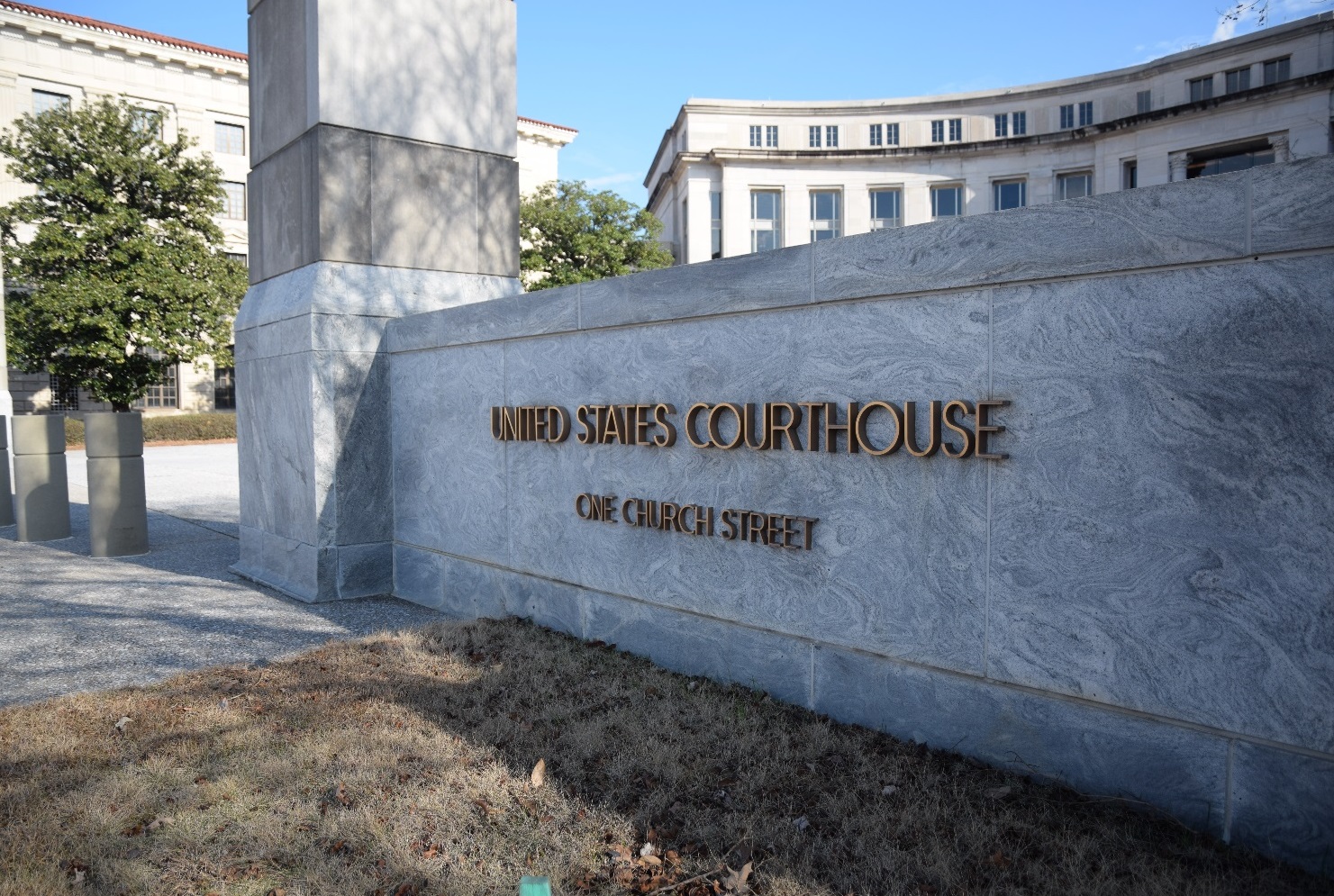
By Jemma Stephenson | MONTGOMERY, Ala. – Attorneys in an ongoing lawsuit against the state over Alabama’s gender affirming care for minors ban turned over a document Tuesday to a federal judge in an investigation of allegations of judge shopping.
U.S. District Court Judge Liles C. Burke ordered the lawyers to turn over the Q&A document, which the attorneys said was used to prepare the lawyers for questions from a three-judge panel investigating allegations that the attorneys manipulated the random assignment of cases to seek a judge favorable to their case.
The attorneys have lodged objections to the production of the document, arguing that it is covered by attorney-client privilege. Burke wants the document for an in camera review.
“Respondents submit the Q&A Document to confirm that their attorney-client privileged communications with their counsel were proper, to resolve this collateral issue as promptly as possible, and to dispense with the reputationally harmful allegations that they sought legal advice in furtherance of a crime or fraud,” the attorneys for the respondents wrote.
The plaintiffs sued Alabama in 2022 over a law making it a felony to prescribe hormones and puberty blockers in gender-affirming care. Burke, who heard the case, initially ruled for the plaintiffs and blocked the state law. But a three-judge panel of the 11th Circuit overturned his ruling last year. The plaintiffs are seeking a full review of the decision by the circuit.
Multiple challenges to the law were filed after Gov. Kay Ivey signed the bill into law in 2022. After multiple transfers of the cases, the attorneys withdrew the case and later refiled it. Burke said the moves gave the appearance of judge shopping, which the investigative panel said had occurred in a report in October.
In a separate Tuesday filing, the attorneys also objected to Burke’s order to turn over the document, objecting to the judge’s portraying of the panel’s findings.
“Even if the one or two narrow examples cited by the panel were really ‘inconsistencies and apparent misrepresentations’ (they are not), they do not support or justify this Court’s all-encompassing claim that the Panel ‘unanimously discredited’ the Walker Respondents’ testimony or otherwise ‘reject[ed] their testimony as unworthy of belief,’” they wrote.
The attorneys also pushed back against a Burke claim that an attorney had committed perjury before the panel. In an October report from the panel the judges wrote that one attorney had “deliberately misled” the panel about a phone call to a judge’s chamber, which Burke connected to perjury.
“There is no basis to conclude that no reasonable person could believe in good faith that he potentially perjured himself,” Burke wrote. “Likewise, there is no basis to conclude that an in camera review of the Q&A document would surely fail to turn up evidence that he intentionally lied to the court.”
The attorneys wrote that the claim of “perjury” is not supported by facts and referenced an earlier order. They also wrote that the panel did not wholly discredit their testimony and wrote that claims of a lack of candor were limited to one footnote.
“To be clear, however, Walker counsel’s candor on the whole is concerning,” the panel wrote in a footnote.
They wrote that claims of a prima-facie case only exists because of the panel’s findings, which had due-process violations. They wrote that some were denied a right to counsel and others were excluded from proceedings.
“Respondents continue to steadfastly maintain that they testified truthfully and honestly before the Panel and in subsequent submissions to this Court. There is no basis for this Court to assert that the Panel disbelieved or discredited Respondents’ testimony or otherwise engaged in any purported fraud on the Court,” they wrote.
******************************************************************************************

Jemma Stephenson covers education as a reporter for the Alabama Reflector. She previously worked at the Montgomery Advertiser and graduated from the Columbia University Graduate School of Journalism.
******************************************************************************************
The preceding article was previously published by the Alabama Reflector and is republished with permission.
The Alabama Reflector is an independent, nonprofit news outlet dedicated to covering state government and politics in the state of Alabama. Through daily coverage and investigative journalism, The Reflector covers decision makers in Montgomery; the issues affecting Alabamians, and potential ways to move our state forward.
We’re part of States Newsroom, the nation’s largest state-focused nonprofit news organization.
U.S. Federal Courts
Federal judge wants Q&A doc from lawyers in trans medical case
The report concluded lawyers had engaged in judge-shopping, adding sometimes lawyers consider potential judges in determining where to file
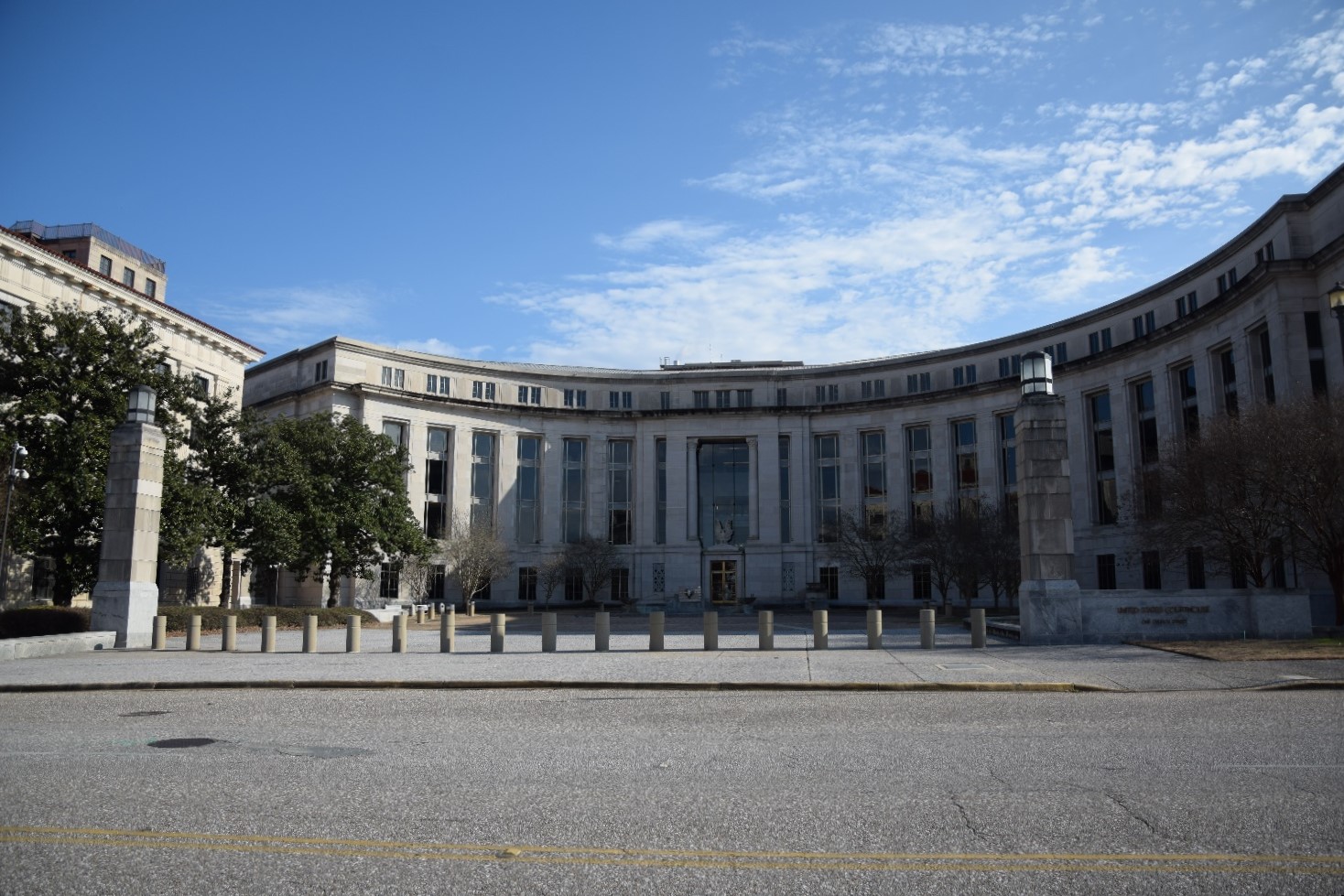
By Jemma Stephenson | MONTGOMERY, Ala. – A federal judge in Montgomery Friday ordered attorneys representing transgender families to turn over a document used to prep lawyers ahead of a hearing over alleged judge shopping.
In the 51-page filing, U.S. District Judge Liles C. Burke told the lawyers to provide the information, known as a Q&A document, to the judge for an in-camera review, to decide whether or not the document is covered by attorney-client privilege.
Burke, appointed by former President Donald Trump, has accused the attorneys for the families of trying to a get a judge that would be favorable to their case.
“This is not an ordinary civil case in which a court simply disbelieved testimony about an important fact: here, a three-judge panel was investigating whether lawyers intentionally attempted to subvert the administration of justice by judge-shopping, unanimously found that they did, unanimously disbelieved their explanations that they did not, unanimously expressed concern about their candor, and unanimously found that one lawyer lied outright,” he wrote. “If this is not enough to open the door for an in camera review of the Q&A document, it is difficult to imagine what would suffice.”
According to the Legal Information Institute, “in camera” reviews “are held in private before a judge where the press and the public are not allowed to take part.”
In May, a filing from the attorneys said that the document was an appropriate preparation for questions from a panel investigating the allegations and not under a continuing order from the panel or generated to further crime or fraud. They wrote that it should not trigger the crime-fraud exception and that if an in-camera review must take place, it should be done by a special master.
A message was left with attorney Barry Ragsdale, who according to Burke created the document and represents some of the accused attorneys. A message was also left with the attorney for Kathleen Hartnett, who according to Burke’s filing has her own attorney. The whole Walker team was formerly represented by Ragsdale, according to Burke’s filing.
The plaintiffs sued Alabama in 2022 over a law making it a felony to prescribe hormones and puberty blockers in gender-affirming care. Burke, who heard the case, initially ruled for the plaintiffs and blocked the state law. But a three-judge panel of the 11th Circuit overturned his ruling last year. The plaintiffs are seeking a full review of the decision by the circuit.
In 2022, shortly after Gov. Kay Ivey signed the restrictions on gender-affirming medical care, multiple lawsuits were filed against the law. According to an October report from a panel that investigated the charges of judge shopping, the first lawsuit in the U.S. Northern District of Alabama was originally assigned to U.S. District Judge Anna Manasco, who recused herself. The case was reassigned to Magistrate Judge Staci G. Cornelius. There was not unanimous consent for “dispositive jurisdiction” by a magistrate judge, so the court was reassigned to Judge Annemarie Carnie Axon.
The second lawsuit was filed in the U.S. Middle District of Alabama, and the attorneys marked the case as related to Corbitt v. Taylor, a 2018 case. The case was assigned to Chief Judge Emily C. Marks. The attorneys filed a motion that the case be reassigned to Judge Myron H. Thompson, who presided over Corbitt. Thompson has historically ruled for abortion and civil rights cases. They also called Thompson’s chambers.
In the report, the panel accused an attorney of having “deliberately misled” the panel about the call to Thompson’s office. In the Friday filing, Burke wrote that this “provides a stand-alone evidentiary basis for a prima facie showing of fraud on the court.”
“Put differently, the Panel’s finding (and independently, the transcripts they rely on) support a prima facie case of perjury as a ‘crime,’ but they also suffice to show a prima facie case of fraud on the court under the separate heading of ‘fraud,’” he wrote.
According to the October filing, Marks entered an order to show why the case should not be transferred to the Northern District. Lawyers from the two cases had a conference call, and the parties consented to a transfer. Then the attorneys responded to the order and withdrew their motion. Marks transferred the case and it was randomly assigned to Burke, who set a hearing date. The attorneys in the cases were going to consolidate their cases.
Axon was presiding over a criminal trial, so the first case was transferred to Burke. The state attorneys then indicated that they would not file a motion to consolidate.
Within minutes of each other, both of the lawsuits were dismissed by the attorneys. Attorneys told reporters that they were planning to refile.
Burke filed an order that included that the lawyers were giving an appearance of judge shopping. At his direction, the clerk forwarded that order to the chief judge of each district in Alabama.
A new case was filed in the U.S. Middle District and was assigned to Burke by designation.
The panelists’ October report concluded that the lawyers engaged in judge-shopping.
“The Panel is not naïve,” the panel wrote in their October report. “Lawyers sometimes consider potential judicial assignments in determining where to file a case, and there may be reasons why in certain cases some judges may be considered more favorable draws than others. So the panel does not condemn the lawyers for fretting about their chances of success before a particular judge. Of course, the irony here is that counsel ultimately succeeded before Judge Burke. But in this case, counsel did more than fret. They made plans and took steps in an attempt to manipulate the assignment of these cases.”
Since then, Burke has requested that the document be overturned and met with the accused attorneys after a recent court hearing. The panelists had asked the attorneys if they had been coached on what to say in the proceedings, and most of the lawyers said no. One lawyer, Milo Inglehart, said he had been provided the Q&A document the night before that included talking points in response to some potential questions.
The panel asked for the document to be turned over. The attorney did not do so, allegedly at the direction of Ragsdale.
“Mr. Ragsdale unilaterally decided that Mr. Inglehart could avoid producing the Q&A Document anyway—even though the Panel had just rejected counsel’s arguments that the attorney-client privilege or the work-product doctrine shielded it from disclosure—because the July 25 order exempted ‘privileged communications’ from disclosure in the respondents’ declarations,” wrote Burke in a footnote. “Even though the panel denied the request for a protective order, Mr. Inglehart nonetheless withheld the Q&A document as privileged at his counsel’s advice.”
The judge wrote that the document must be provided by 5 p.m. on Tuesday.
******************************************************************************************

Jemma Stephenson covers education as a reporter for the Alabama Reflector. She previously worked at the Montgomery Advertiser and graduated from the Columbia University Graduate School of Journalism.
******************************************************************************************
The preceding article was previously published by the Alabama Reflector and is republished with permission.
The Alabama Reflector is an independent, nonprofit news outlet dedicated to covering state government and politics in the state of Alabama. Through daily coverage and investigative journalism, The Reflector covers decision makers in Montgomery; the issues affecting Alabamians, and potential ways to move our state forward.
We’re part of States Newsroom, the nation’s largest state-focused nonprofit news organization.
U.S. Federal Courts
Club Q shooter gets life in prison for federal hate crimes
“The 2022 mass shooting at Club Q is one of the most violent crimes against the LGBTQIA+ community in history” – FBI Director Wray
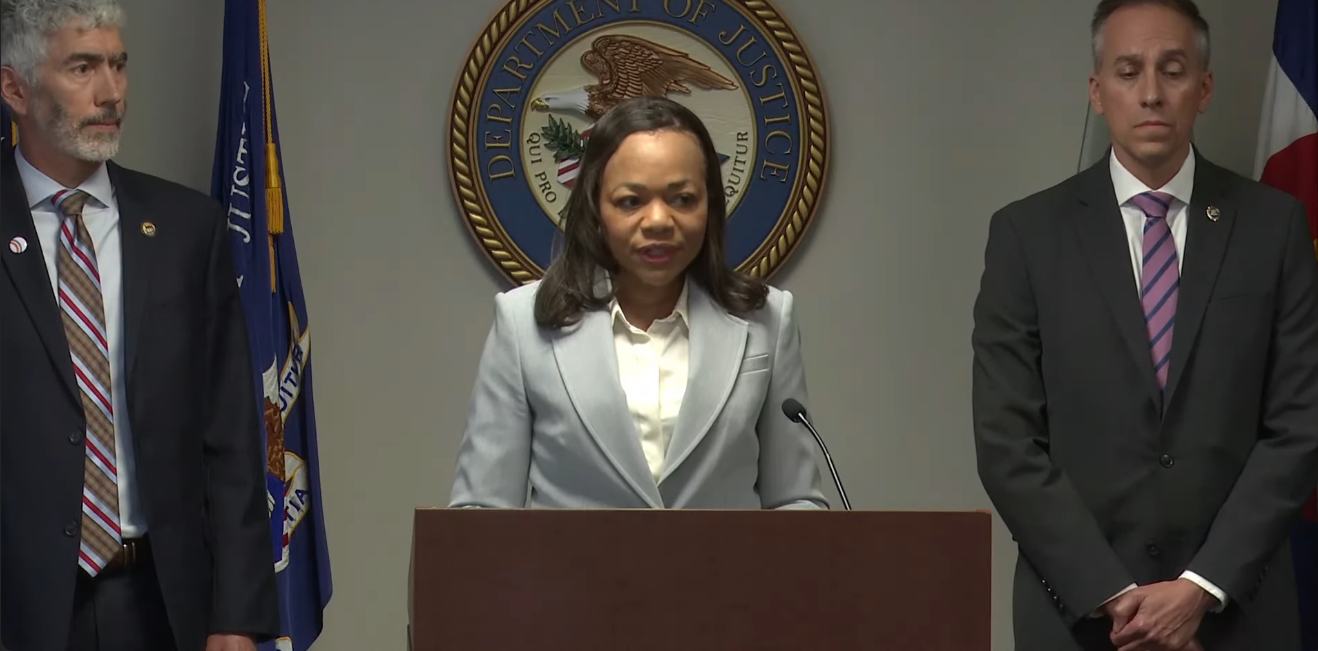
DENVER, Colo. – Anderson Lee Aldrich, 24, formerly of Colorado Springs, Colorado, was sentenced to 55 concurrent life sentences to run consecutive to 190 years in prison after pleading guilty to 74 hate crimes and firearms charges related to the Nov. 19, 2022, mass shooting at Club Q, an LGBTQ+ establishment in Colorado Springs.
According to the plea agreement, Aldrich admitted to murdering five people, injuring 19, and attempting to murder 26 more in a willful, deliberate, malicious, and premediated attack at Club Q. According to the plea, Aldrich entered Club Q armed with a loaded, privately manufactured assault weapon and began firing. Aldrich continued firing until subdued by patrons of the Club. As part of the plea, Aldrich admitted that this attack was in part motivated because of the actual or perceived sexual orientation and gender identity of any person.
“Fueled by hate, the defendant targeted members of the LGBTQIA+ community at a place that represented belonging, safety, and acceptance – stealing five people from their loved ones, injuring 19 others, and striking fear across the country,” said Attorney General Merrick B. Garland. “Today’s sentencing makes clear that the Justice Department is committed to protecting the right of every person in this country to live free from the fear that they will be targeted by hate-fueled violence or discrimination based on who they are or who they love. I am grateful to every agent, prosecutor, and staff member across the Department – from the U.S. Attorney’s Office for the District of Colorado, to the Civil Rights Division, the ATF, and FBI – for their work on this case. The Justice Department will never stop working to defend the safety and civil rights of all people in our country.”
“The 2022 mass shooting at Club Q is one of the most violent crimes against the LGBTQIA+ community in history,” said FBI Director Christopher Wray. “The FBI and our partners have worked tirelessly towards this sentencing, but the true heroes are the patrons of the Club who selflessly acted to subdue the defendant. This Pride Month and every month, the FBI stands with the survivors, victims, and families of homophobic violence and hate.”
“ATF will not rest until perpetrators like this defendant are prosecuted to the fullest extent of the law,” said Director Steven Dettelbach of the Bureau of Alcohol, Tobacco, Firearms and Explosives (ATF). “I hope today’s life sentence brings at least some peace to the victims and survivors of this senseless, horrific tragedy. That this sentence should come during Pride month reinforces how far we have left to go before all communities, including all LGBTQIA+ communities, are safe here. It also shows how far ATF and all our partners will go to ensure hatred does not win.”
“The defendant’s mass shooting and heinous targeting of Club Q is one of the most devastating assaults on the LGBTQIA+ community in our nation’s history. This sentence cannot reclaim the lives lost or undo the harms inflicted. But we hope that it provides the survivors, the victims’ families, and their communities a small measure of justice,” said Assistant Attorney General Kristen Clarke of the Justice Department’s Civil Rights Division. “Our message today should be loud and clear. No one should have to fear for their life or their safety because of their gender identity or sexual orientation. The Justice Department will vigorously investigate and prosecute those who perpetrate hate-fueled, bias-driven attacks.”
“Hate has no place in our country and no place in Colorado” said Acting U.S. Attorney Matt Kirsch for the District of Colorado. “I hope that today’s sentence demonstrates to the victims and those connected to this horrific event that we do not tolerate these heinous acts of violence.”
The FBI Denver Field Office, Colorado Springs Police Department, and ATF investigated the case.
Assistant U.S. Attorneys Alison Connaughty and Bryan Fields for the District of Colorado and Trial Attorney Maura White of the Justice Department’s Civil Rights Division prosecuted the case.
Related:
U.S. Federal Courts
Appeals Court overturns Okla. anti-Trans birth certificate policy
The U.S. District Court dismissed the complaint in June 2023, and Lambda Legal appealed the decision to the Tenth Circuit Court of Appeals

DENVER, Colo. – The U.S. Court of Appeals for the Tenth Circuit overturned a lower court ruling that had dismissed a lawsuit challenging Oklahoma Governor Kevin Stitt’s anti-trans birth certificate policy, which categorically prohibits transgender people from correcting the gender marker on their birth certificates to match their gender identity.
All three members of the panel agreed that the lawsuit stated a valid claim of unconstitutional discrimination against transgender people and that the government’s justifications for this discrimination were irrational.
The court explained the Constitution requires that “there must be some rational connection between the Policy and a legitimate interest. There is no rational connection here—the Policy is in search of a purpose.” A majority of the court also held that any government discrimination against transgender people triggers heightened judicial scrutiny.
“This ruling stands as a monumental win for the transgender community in Oklahoma and nationwide, sending a clear message to lawmakers everywhere that unconstitutional discrimination against transgender people will not be tolerated by the courts,” said Lambda Legal Senior Counsel Peter Renn. “This ruling comes at a critical time amidst a surge in anti-transgender policies of all stripes across the country. That includes attempts, like the one here, to roll back the basic ability of transgender people to correct their identity documents to match who they are, which can expose them to harassment, abuse, and physical danger.”
On November 8, 2021, Oklahoma Gov. Kevin Stitt issued an executive order that reversed the Oklahoma State Department of Health’s (OSDH) prior practice of allowing transgender people to correct their birth certificates to match their gender identity, which had existed for at least 14 years from 1997-2021.
Governor Stitt explained, “I believe that people are created by God to be male or female. Period,” and vowing to take “whatever action necessary to protect Oklahoma values and our way of life.” Previously, transgender people could correct their birth certificates by presenting a court order to OSDH, but following the executive order, OSDH has refused to comply with such orders.
Lambda Legal joined by Tulsa attorney Karen Keith Wilkens filed a lawsuit in U.S. District Court for the Northern District of Oklahoma on March 14, 2022 challenging the Oklahoma Republican Governor’s executive order.
The U.S. District Court dismissed the complaint in June 2023, and Lambda Legal appealed the decision to the Tenth Circuit Court of Appeals.
U.S. Federal Courts
Doctor charged: Unauthorized access to personal info of trans kids
If convicted, Dr. Haim faces up to 10 years in federal prison and a $250,000 maximum possible fine for his actions

HOUSTON – A Houston doctor has been indicted for obtaining protected individual health information for patients that were not under his care and without authorization, announced Alamdar S. Hamdani, the United States attorney for the Southern District of Texas.
The case against Ethan Haim, 34, Dallas, has now been unsealed, and he is set to make his initial appearance before U.S. Magistrate Yvonne Y. Ho in Houston.
The four-count indictment alleges Haim obtained personal information including patient names, treatment codes and the attending physician from Texas Children’s Hospital’s (TCH) electronic system without authorization. He allegedly obtained this information under false pretenses and with intent to cause malicious harm to TCH.
According to the indictment, Haim was a resident at Baylor College of Medicine and had previous rotations at TCH as part of his residency.
In April 2023, Haim allegedly requested to re-activate his login access at TCH to access pediatric patients not under his care. The indictment alleges he obtained unauthorized access to personal information of pediatric patients under false pretenses and later disclosed it to a media contact.
According to Houston’s CBS News affiliate KHOU-TV 11, shortly after Haim allegedly accessed the records, Texas Attorney General Ken Paxton announced he was launching an investigation into Texas Children’s Hospital to find out whether they are “actively engaging in illegal behavior and performing gender transitioning procedures on children.
Calling himself a ‘whistleblower’ last year as the FBI conducted the investigation, he tweeted a request for funding to support his legal defense:
I blew the whistle on @TexasChildrens secret sex change program and the @TheJusticeDept came after me for exposing the truth. After experiencing DOJ corruption we've decided to fight back. If you want to join the fight, donate below. https://t.co/ZMhL9LG3o1
— Eithan Haim MD (@EithanHaim) March 10, 2024
If convicted, Haim faces up to 10 years in federal prison and a $250,000 maximum possible fine.
U.S. Federal Courts
LGBTQ Title IX protections blocked in six more states
Chief Judge Danny Reeves of the U.S. District Court blocks Biden Title IX rules, says ‘sex,’ ‘gender identity’ not the same thing

By McKenna Horsley | LEXINGTON, Ky. – A federal judge has blocked new Title IX rules, including those aimed at protecting LGBTQ+ students from discrimination in K-12 schools, and sided with Republican attorneys general in several states — including Kentucky.
Chief Judge Danny Reeves of the U.S. District Court in Eastern Kentucky on Monday issued a ruling siding with Republican Attorney General Russell Coleman and his counterparts in five other states. The ruling prevents the U.S. Department of Education from “implementing, enacting, enforcing, or taking any action to enforce the Final Rule, Nondiscrimination on the Basis of Sex in Education Programs or Activities Receiving Federal Financial Assistance,” which was set to begin Aug. 1.

Coleman and the GOP attorneys general filed the lawsuit in April. At the time, they argued the Department of Education “used rulemaking power to convert a law designed to equalize opportunities for both sexes into a far broader regime of its own making” with the new Title IX regulations.
Reeves limited the injunction to the plaintiff-states of Tennessee, Kentucky, Ohio, Indiana, Virginia and West Virginia.
The Biden administration introduced the rules to “build on the legacy of Title IX by clarifying that all our nation’s students can access schools that are safe, welcoming, and respect their rights,” U.S. Secretary of Education Miguel Cardona said in a statement. The rules also would have rolled back Trump administration changes that narrowly defined sexual harassment and directed schools to conduct live hearings, allowing those who were accused of sexual harassment or assault to cross-examine their accusers.
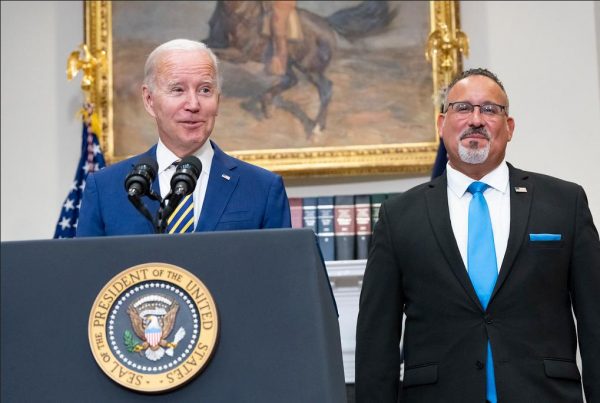
In their complaint, the state attorneys general said that under the Biden rule, “Men who identify as women will, among other things, have the right to compete within programs and activities that Congress made available to women so they can fairly and fully pursue academic and athletic excellence — turning Title IX’s protections on their head. … And anyone who expresses disagreement with this new status quo risks Title IX discipline for prohibited harassment.”
Established in 1972, Title IX was created to prevent “discrimination based on sex in education programs or activities that receive federal financial assistance,” according to the Department of Education.
Reeves wrote in his opinion that “the Department of Education seeks to derail deeply rooted law” created by the implementation of Title IX.
“At bottom, the Department would turn Title IX on its head by redefining ‘sex’ to include ‘gender identity.’ But ‘sex’ and ‘gender identity’ do not mean the same thing,” he wrote. “The Department’s interpretation conflicts with the plain language of Title IX and therefore exceeds its authority to promulgate regulations under that statute.”
In a press release, Coleman’s office said Monday that schools that would fail to comply with the new rules would risk losing federal funding. Citing the Department of Education, the office said Kentucky’s public and private schools received a total of $1.1 billion in federal funding last year.
“As a parent and as Attorney General, I joined this effort to protect our women and girls from harm. Today’s ruling recognized the 50-plus years of educational opportunities Title IX has created for students and athletes,” Coleman said in the press release. “We’re grateful for the court’s ruling, and we will continue to fight the Biden Administration’s attempts to rip away protections to advance its political agenda.”
A spokesperson for the department said it was reviewing the ruling.
“Title IX guarantees that no person experience sex discrimination in a federally-funded educational environment,” the spokesperson added. “The Department crafted the final Title IX regulations following a rigorous process to realize the Title IX statutory guarantee. The Department stands by the final Title IX regulations released in April 2024, and we will continue to fight for every student.”
******************************************************************************************

McKenna Horsley covers state politics for the Kentucky Lantern. She previously worked for newspapers in Huntington, West Virginia, and Frankfort, Kentucky. She is from northeastern Kentucky.
******************************************************************************************
The preceding story was previously published by the Kentucky Lantern and is republished with permission.
The Kentucky Lantern is an independent, nonpartisan, free news service based in Frankfort a short walk from the Capitol, but all of Kentucky is our beat.
We focus on how decisions made in the marble halls of power ripple through the lives of Kentuckians. We bring attention to injustices and hold institutions and officials accountable. We tell the stories of Kentuckians who are making a difference and shine a light on what’s working. Our journalism is aimed at building a fairer, healthier Kentucky for all.
Kentucky Lantern is part of States Newsroom, the nation’s largest state-focused nonprofit news organization.
-

 Arts & Entertainment5 hours ago
Arts & Entertainment5 hours ago2025 Best of LGBTQ LA Readers’ Choice Award Nominations
-

 Obituary3 days ago
Obituary3 days agoNanette Kazaoka, an unlikely AIDS activist, dies at 83
-

 Television4 days ago
Television4 days agoNo, ‘Mid-Century Modern’ is not a ‘Golden Girls’ remake
-

 Local7 hours ago
Local7 hours ago‘Think of those who have not been seen,’ Cynthia Erivo’s powerful message at GLAAD Awards
-

 Features6 hours ago
Features6 hours agoTristan Schukraft: Keeping Our Queer Spaces Thriving
-

 Opinions5 hours ago
Opinions5 hours agoGay bar in California bans MAGA gear — but no other political expression — from its premises







